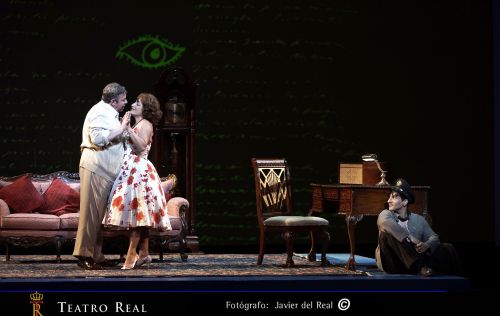 Spain D. Catán, Il Postino: Teatro Real orchestra and chorus / Pablo Heras-Casado (conductor), Madrid Teatro Real, 23.7.2013. (JMI)
Spain D. Catán, Il Postino: Teatro Real orchestra and chorus / Pablo Heras-Casado (conductor), Madrid Teatro Real, 23.7.2013. (JMI)
Coproduction: Los Angeles Opera, Theater an der Wien and Théâtre du Châtelet.
Direction: Ron Daniels
Sets and Costumes: Riccardo Hernández
Lighting: Jennifer Tipton
Videos: Philip Bussmann
Cast:
Pablo Neruda: Vicente Ombuena
Mario Ruoppolo: Leonardo Capalbo
Beatrice Russo: Sylvia Schwartz
Matilde Neruda: Cristina Gallardo-Domas
Donna Rosa: Nancy Fabiola Herrera
Giorgio: Víctor Torres
Di Cosimo: Federico Gallar
Mario’s father: Eduardo Santamaría
Priest: José Carlo Marino

The Teatro Real closed its opera season with this work by Daniel Catan, and had hoped it would include the presence of Plácido Domingo, an artist particularly admired in Madrid, where he was born in 1941. Unfortunately, he had to cancel during rehearsals after suffering a pulmonary embolism. It seems that health and age do not respect even Superman.
The Mexican Daniel Catan has been one of the few composers to achieve success in recent years, but sadly he died before he could enjoy it. He composed four operas, the first La Hija de Rappaccini, dating from 1991, when Catan was 42. This was followed by Florencia en el Amazonas (Houston, 1996), Salsipuedes (Houston, 2004) and, finally, Il Postino (Los Angeles, 2010).
Il Postino is based on the movie of the same title by Michael Radford and is a tribute to Chilean poet Pablo Neruda. The libretto is by the composer and narrates in a series of scenes the poet’s life in Italy in the 50s and his relationship with the villagers, especially the young postman of the village. It is not a masterpiece in operatic terms, but it is an opera that is easy to listen to, and is much friendlier than other modern operas I have heard in recent years. The opera has a first part – the first two acts – that is lyrical and even romantic, while the last act, with the return of Neruda and the death of the communist postman, becomes more dramatic. The style of Catan in this opera is post-romantic with plenty of musical dialogues and some inspired duets.
Il Postino was written with Placido Domingo in mind for the part of Pablo Neruda, and since the premiere of the opera the identification of Domingo with the character has become so entrenched that without him there are artistic consequences.
The stage production is by Ron Daniels, and is the same that was premiered in Los Angeles and has subsequently traveled to several countries, including Austria, France, Mexico and Chile. The production is well suited to the opera, consisting of a series of short scenes, achieved using small sets with props appropriate for the different locations. Video projections play an important role and the direction of actors is excellent.
To this reviewer the best part of the performance lay in the musical direction of Pablo Heras-Casado, who showed a deep knowledge of the score and whose reading was completely engaging. Mr. Heras-Casado has become an excellent conductor and I hope we can hear more from him in other Spanish theaters. Under his baton was a remarkable orchestra, one that is certainly the best pit orchestra in Spain after Valencia’s Palau de Les Arts.
Vicente Ombuena had to take over the character of Pablo Neruda in place of Placido Domingo. The situation was not easy for him and his performance was better than could have been expected under the circumstances. He is the only other tenor to have sung this role, and in taking it on Ombuena solved a very serious problem for the Teatro Real. His stage performance was very convincing at all times, but his voice has little in common with Domingo’s. The role requires an excellent middle range and that is where he is not so strong.
It is worth remembering that he has been singing comprimario roles during the last few years.
In the title role was Mario Ruoppolo, Il Postino, whose importance in the opera is even greater than that of Pablo Neruda. He was played by Leonardo Capalbo, whose performance was very convincing on stage, but the timbre of his voice is not attractive and he fell a little short of what was necessary in the more dramatic passages of the last act. In the Los Angeles premiere Charles Castrovono created the role and although his voice is richer than Capalbo’s, Capalbo’s interpretation was just as compelling as the original.
Spanish soprano Sylvia Schwartz was a convincing interpreter of Beatrice Russo, but vocally I found her insufficient for the character, although the public did not seem to share my opinion. In the first half of the opera her small light soprano was well suited to this romantic character, but in the last act her voice was not strong enough, and was mostly inaudible in the ensembles.
Chilean soprano Cristina Gallardo Domas has always been the interpreter of Matilde, the wife of the poet, and she continues to do this extremely well, apart from the fact that her voice shows signs of fatigue as the score tends upward.
Nancy Fabiola Herrera was very well cast as Donna Rosa, a fun character.
The Teatro Real was almost sold out, but had empty seats after the interval. The audience reaction was no more than polite, with some cheers for the three main protagonists of the opera.
José Mª Irurzun